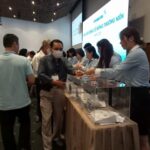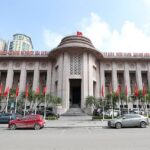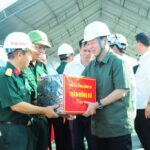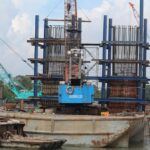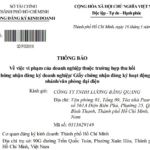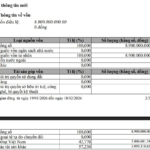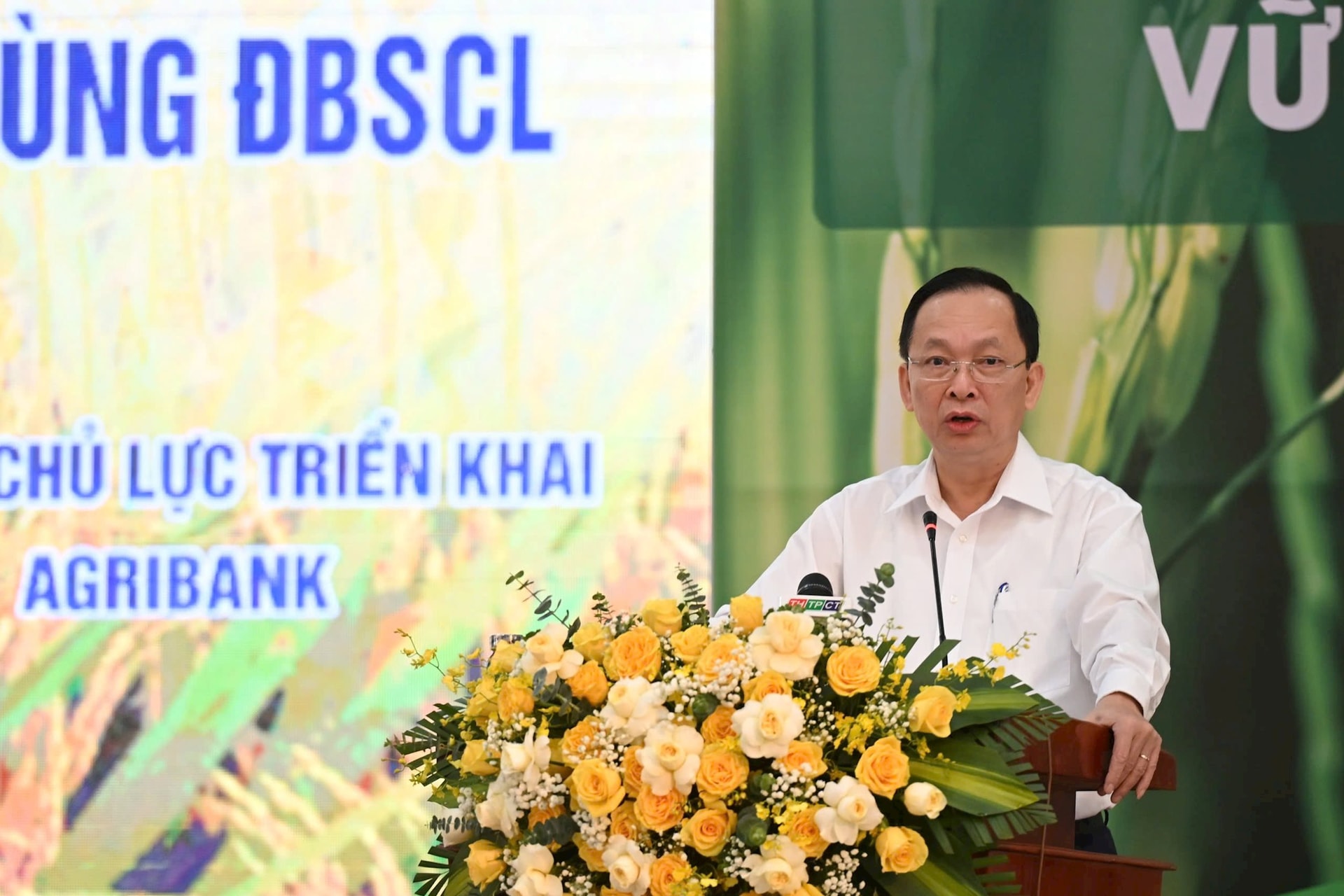
Deputy Governor of the SBV speaks at the Conference
On November 7, 2022, in Dong Thap, the State Bank of Vietnam (SBV) in collaboration with the Ministry of Agriculture and Rural Development of Vietnam, the People’s Committee of Dong Thap province, organized a Conference to deploy the preferential credit program to implement the Project of 1 million hectares of high-quality, low-emission rice in the Mekong Delta.
The conference was co-chaired by Mr. Dao Minh Tu, Deputy Governor of the State Bank of Vietnam (SBV); Mr. Tran Thanh Nam, Deputy Minister of Agriculture and Rural Development; and Mr. Pham Thien Nghia, Chairman of the People’s Committee of Dong Thap province. The conference was attended by leaders of the People’s Committees of 12 provinces/cities in the Mekong Delta, representatives of local departments, branches, and agencies, leaders of the Departments and Branches of the SBV, SBV branches in provinces and cities, associations, and enterprises in the area, and credit institutions.
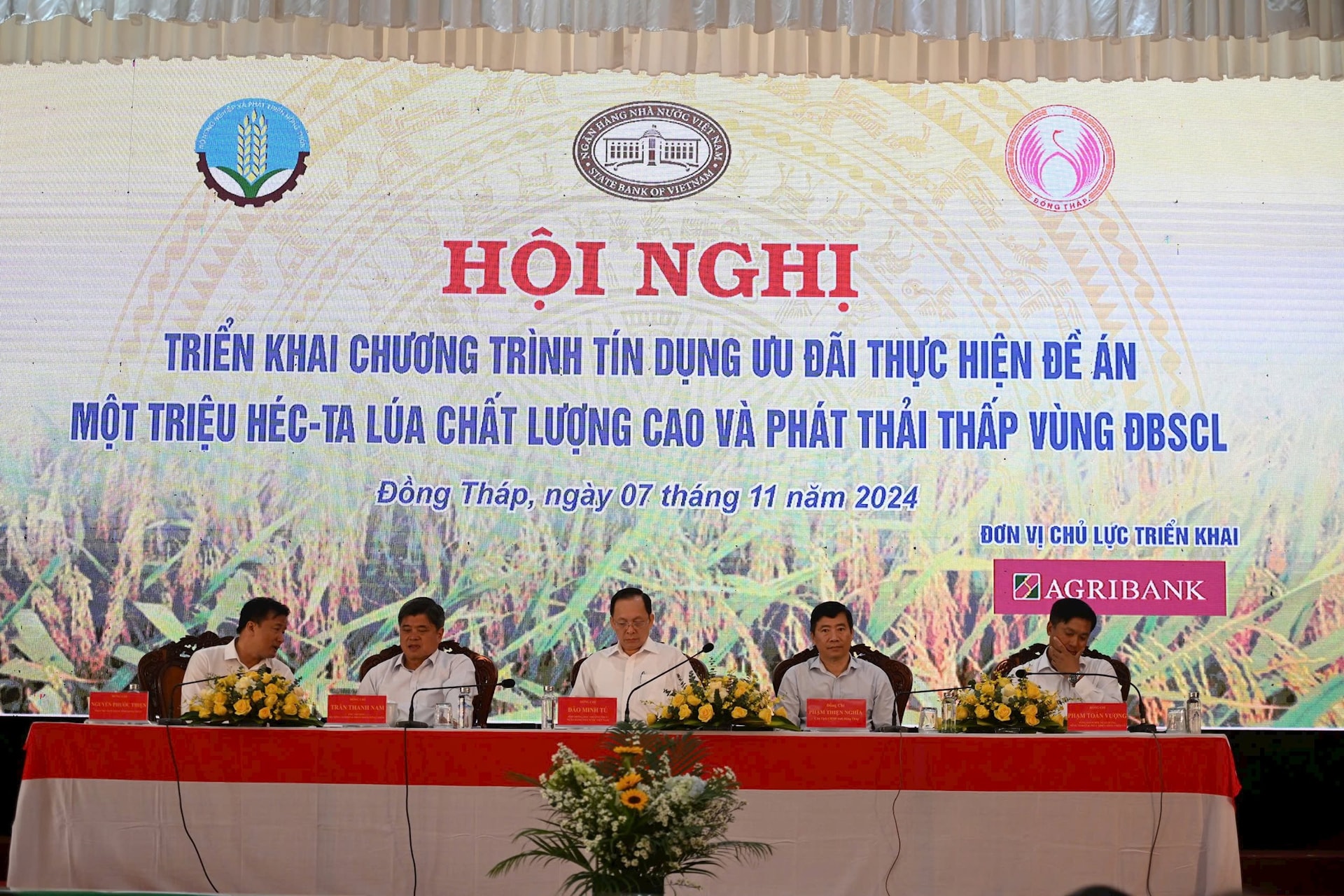
Speaking at the conference, SBV Deputy Governor Dao Minh Tu emphasized that rice is one of the key export agricultural products of Vietnam. To make Vietnam a pioneer in producing high-quality, low-emission rice, creating breakthrough steps for the Vietnamese rice industry, meeting the requirements of the new international trend, and affirming and maintaining the position of Vietnamese rice brands in the international market, the Prime Minister has issued Decision 1490/QD-TTg dated November 27, 2023, approving the Project “Sustainable development of one million hectares of specialized cultivation of high-quality, low-emission rice associated with green growth in the Mekong River Delta by 2030”. The SBV and the banking industry have implemented many credit solutions to support people and enterprises in the Mekong Delta to develop production and business in general and in the production of high-quality rice in particular.
Every year, the SBV’s head office and its branches in localities organize conferences to connect banks and enterprises and conferences on credit for key agricultural products and rice in the Mekong Delta; at the same time, there are many documents directing credit institutions to focus on lending, expanding credit limits, simplifying loan procedures… to meet capital needs from the production stage (fertilizers, seeds, materials…) to the processing, purchasing, and consuming agricultural products and rice; thereby creating the most favorable conditions in credit relations for households, enterprises, and cooperatives producing, trading, and exporting rice.
The Deputy Governor updated that as of the end of September 2024, the mobilized capital in the provinces and cities of the Mekong Delta reached about 857 trillion VND (meeting 72% of the capital demand in the region), up 6.1% compared to the end of 2023; total credit outstanding reached about 1.18 million billion VND, up 8% compared to the end of 2023. Of which, the outstanding balance for the agricultural and rural sector in the region reached about 643 trillion VND, up 7% compared to 2023, accounting for 54% of the total outstanding balance in the region. Especially for the rice industry – the strength of the region, it always has a high credit growth rate, currently reaching about 124 trillion VND, up 18% compared to the end of 2023, accounting for about 11% of the region’s credit balance and 53% of the national rice credit balance.
Regarding the task of the SBV in the Project “Research and propose the construction of a credit program to support the linkage in production, processing, and consumption of high-quality, low-emission rice products in the Mekong Delta between cooperatives and enterprises; the implementation time is from 2025 to 2030”, the SBV has urgently coordinated with ministries, branches, People’s Committees of 12 provinces and cities in the Mekong Delta and related units to build and submit to the Prime Minister a Report on the “Program on linkage lending in production, processing, and consumption of high-quality, low-emission rice products in the Mekong Delta according to Decision 1490/QD-TTg. On October 11, 2024, the SBV issued documents to credit institutions and SBV branches in the provinces and cities of the Mekong Delta to guide the implementation of the Program; documents to the Ministry of Agriculture and Rural Development, People’s Committees of 12 provinces and cities in the Mekong Delta on coordinating the implementation of some contents related to the tasks of the Ministry and localities so that credit institutions have a basis for lending according to the Program.
Some main contents of the Lending Program
Ms. Ha Thu Giang, Director of the Credit Department for Economic Sectors of the SBV, informed the Conference of some main contents of the Lending Program. Specifically:
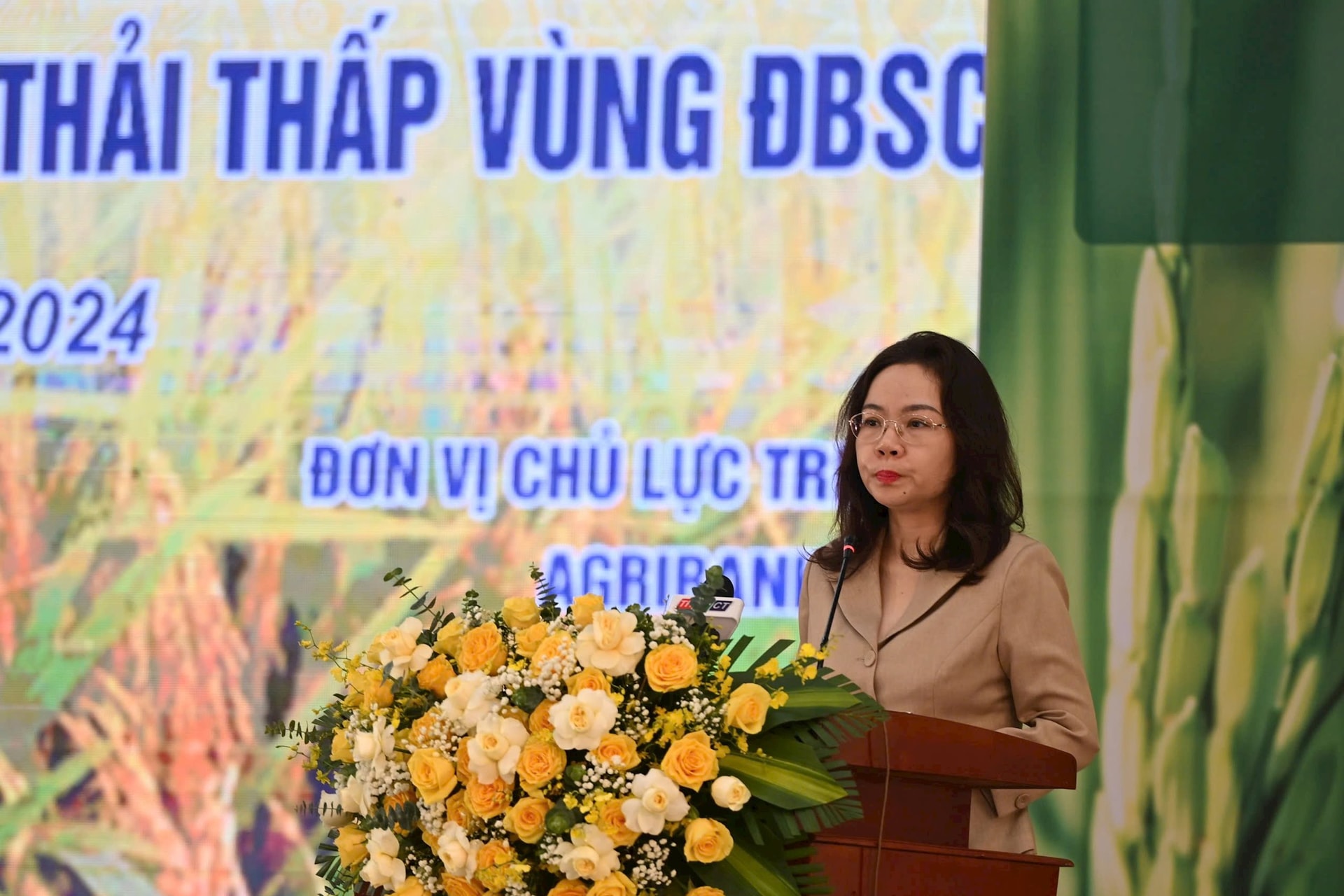
Ms. Ha Thu Giang, Director of the Credit Department for Economic Sectors, speaks
On the implementation stages
: The lending program is implemented in 2 stages (based on the 02 implementation stages of the Project according to Decision 1490), including the pilot stage from now to the end of 2025, in which Agribank is the main lender, and the expansion stage from the end of the pilot stage to 2030 at credit institutions. Currently, based on the framework of the Lending Program as directed by the SBV, Agribank has issued internal guidance documents to pilot lending. At the same time, the SBV encourages other credit institutions to register for lending in the pilot stage and requests banks to be ready with guidance documents to implement in the expansion stage.
On resources and lending principles
: Credit institutions lend from their mobilized capital sources; therefore, lending is carried out under a commercial mechanism with lending conditions according to the current regulations of credit institutions for customers.
On loan terms and purposes
: Meet the short, medium, and long-term capital needs of all stages (production, purchasing, processing, and consumption) in the rice linkage.
On lending interest rates
: Credit institutions actively balance capital sources, cut costs to consider applying lending interest rates that are at least 0.1%/year lower than the lending interest rates of the corresponding term applied to customers with the same term/same group.
To effectively implement the Lending Program, the SBV proposes:
Ministry of Agriculture and Rural Development:
Timely synthesize and publicly announce the specialized cultivation areas, linkages, and subjects participating in the linkage in the production, processing, and consumption of high-quality, low-emission rice products in the Mekong Delta according to the provisions of Decision 1490/QD-TTg for credit institutions to access, consider, and decide on lending.
People’s Committees of 12 provinces and cities in the Mekong Delta
: Determine, list, and publicly announce specialized cultivation areas, linkages, and subjects participating in the linkage in the production, processing, and consumption of high-quality, low-emission rice products in the locality according to Decision 1490/QD-TTg under the guidance of the Ministry of Agriculture and Rural Development; at the same time, send it to the Ministry of Agriculture and Rural Development for synthesis and public announcement so that credit institutions can access, consider, and decide on lending. Promptly notify the Ministry of Agriculture and Rural Development of cases where the subjects no longer participate in the rice linkage. Instruct the specialized agencies of the locality to base on the economic and technical norms issued by the Ministry of Agriculture and Rural Development to determine and announce on the provincial/city portal about the actual cost norms for the rice production stage in the rice linkage according to the standards in Decision 1490/QD-TTg for credit institutions to refer to when determining the loan amount for customers. Direct the local Departments, Branches, and Sectors to monitor, urge, and supervise the subjects participating in the rice linkage in implementing commitments during the implementation of the Project.
Regarding the banking industry, SBV Deputy Governor Dao Minh Tu directed:
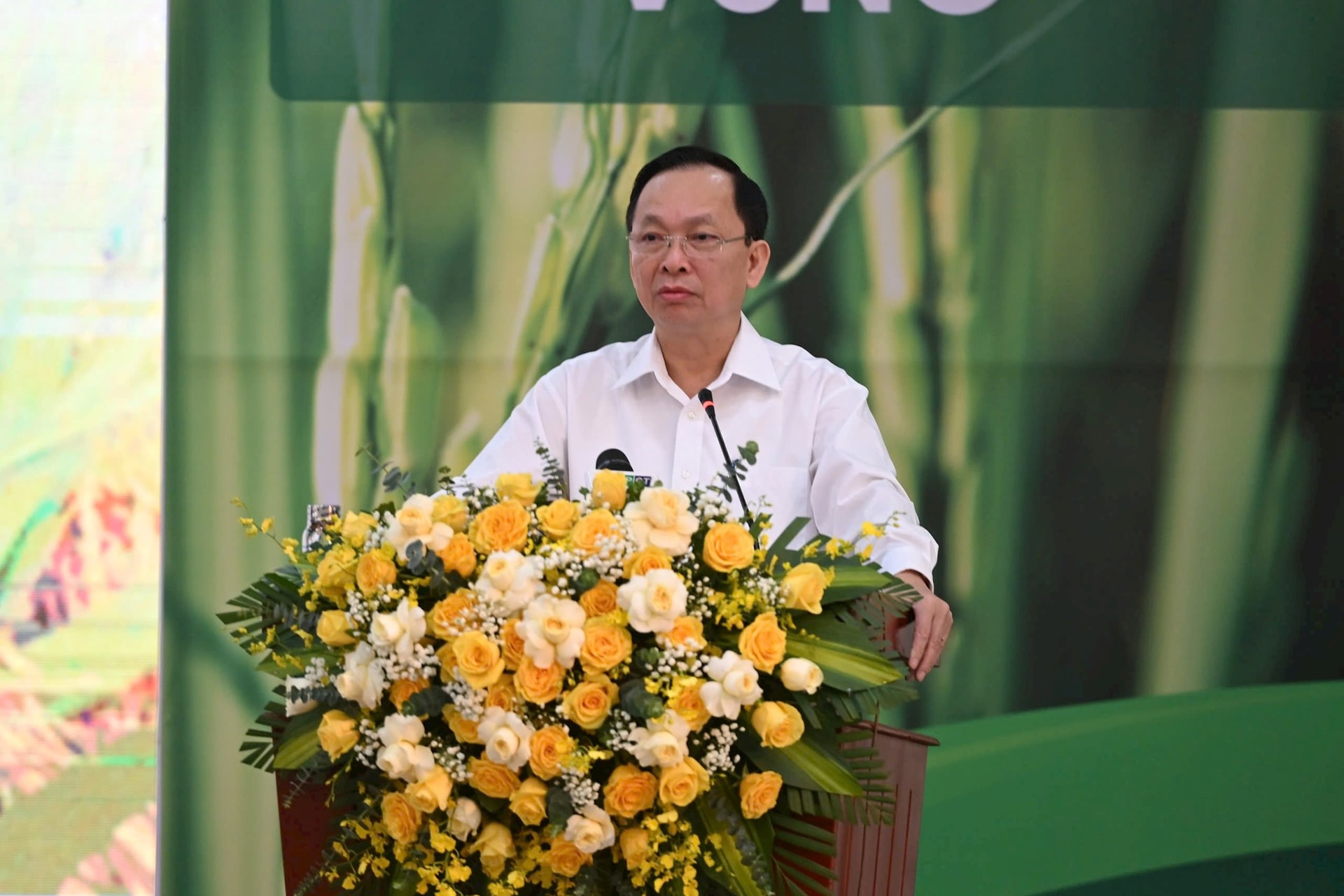
SBV branches in 12 provinces and cities in the Mekong Delta:
Direct and monitor the lending of Agribank branches in the locality according to the Program; coordinate with the local Departments, Branches, and Sectors in organizing the implementation of the Program in the locality; promptly advise the SBV and the Provincial/City People’s Committee to handle difficulties and problems arising in the lending process.
Agribank:
Promote lending according to the Program; determine that lending in the pilot stage is a political task; Strengthen communication and information in the Mekong Delta so that customers who are enterprises, cooperatives, and farmers know and access the policy. Report to the SBV in a timely manner any difficulties and problems arising in the lending process according to the Program.
Other commercial banks:
Consider registering for lending in the pilot stage and be ready with guidance documents to implement in the expansion stage.
Associations and business sectors:
Guide and propagate the Lending Program so that members can grasp and access the policy conveniently.
Households, cooperative groups, cooperatives, and enterprises participating in the Project:
Proactively coordinate in providing full and transparent information about financial and business activities, building production and business plans… for Agribank to have a basis for appraisal and lending decisions. Comply fully with the contents in the linkage agreement between the parties; loan agreement signed with Agribank, credit institutions for lending.
Deputy Governor Dao Minh Tu believes that with the determination and synchronous implementation of ministries, branches, localities, and credit institutions, in which Agribank is the main lender of the Program in the pilot stage, the implementation of the preferential credit program to implement the Project of 1 million hectares of high-quality, low-emission rice in the Mekong Delta will achieve positive results, contributing to increasing the output and export value of the rice industry, expanding the market, affirming the brand, and enhancing the position of Vietnamese rice industry in the international arena.
“Eximbank Shareholders Revolt: A Call to Action Against the Discharge of the Chief Controller.”
A group of major shareholders in Eximbank have raised concerns over the removal of Mr. Ngo Tony from his position as Chief Controller. They believe that the decision to terminate his role was made in violation of legal procedures and have voiced their opposition to this move.
“Proposal for $80 Million Support to Construct a Connector Road Between Dai Ngai Bridge and National Highway 60”
Recent developments in Soc Trang province have prompted a proposal to the Prime Minister regarding the construction of a vital road link. The proposal, sent by the Soc Trang provincial authorities, outlines the importance of building a road segment connecting the Dai Ngai Bridge to National Highway 60, within the province’s boundaries.
Why Do Lending Institutions Hesitate to Finance Agriculture?
The Mekong Delta region is highly vulnerable to the impacts of climate change, including rising sea levels, saltwater intrusion, and flooding. As per Mr. Tran Viet Truong, Chairman of the Can Tho People’s Committee, these risks make lending institutions hesitant to provide loans as the agricultural sector in this region is heavily dependent on weather and nature.

